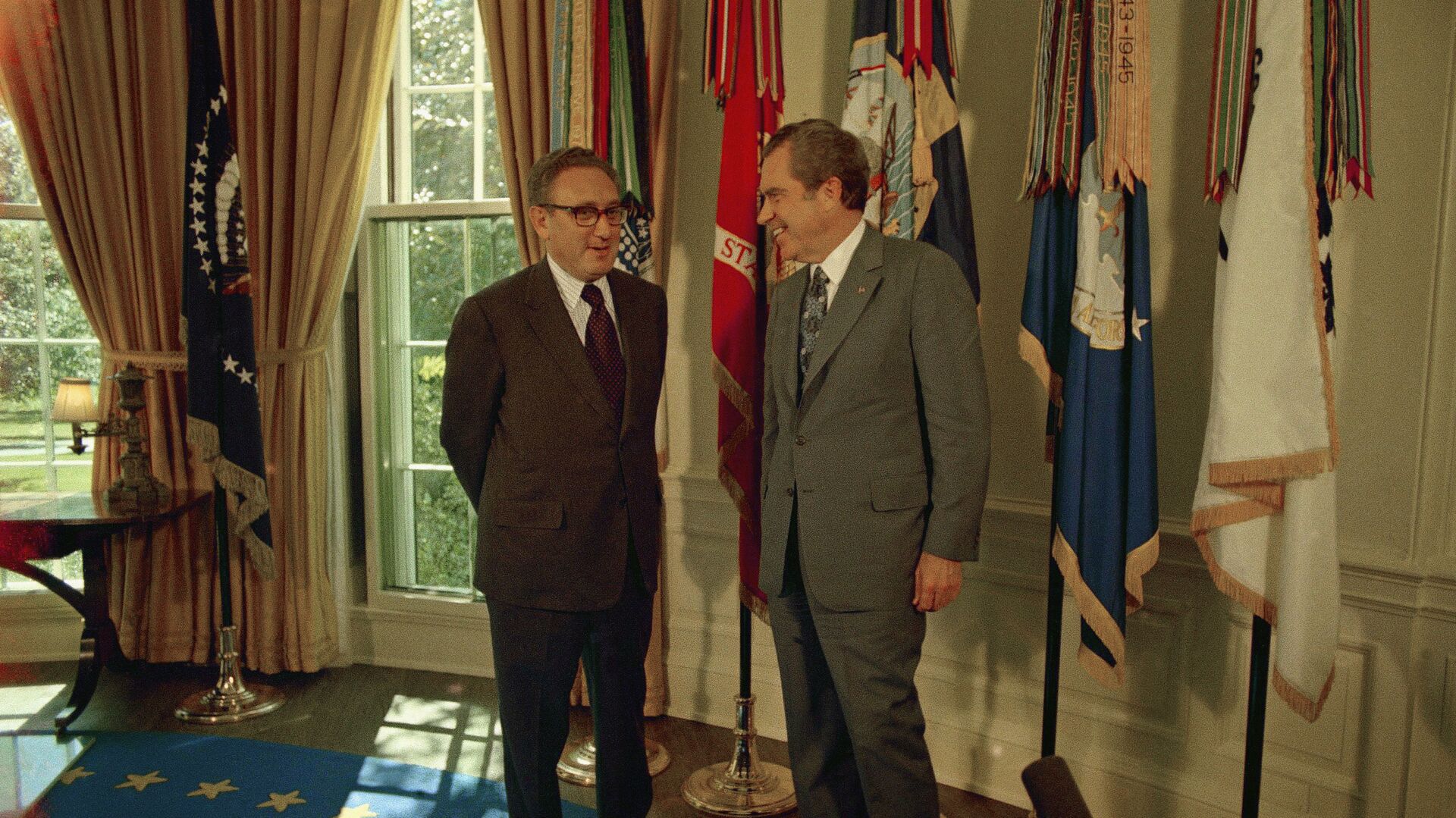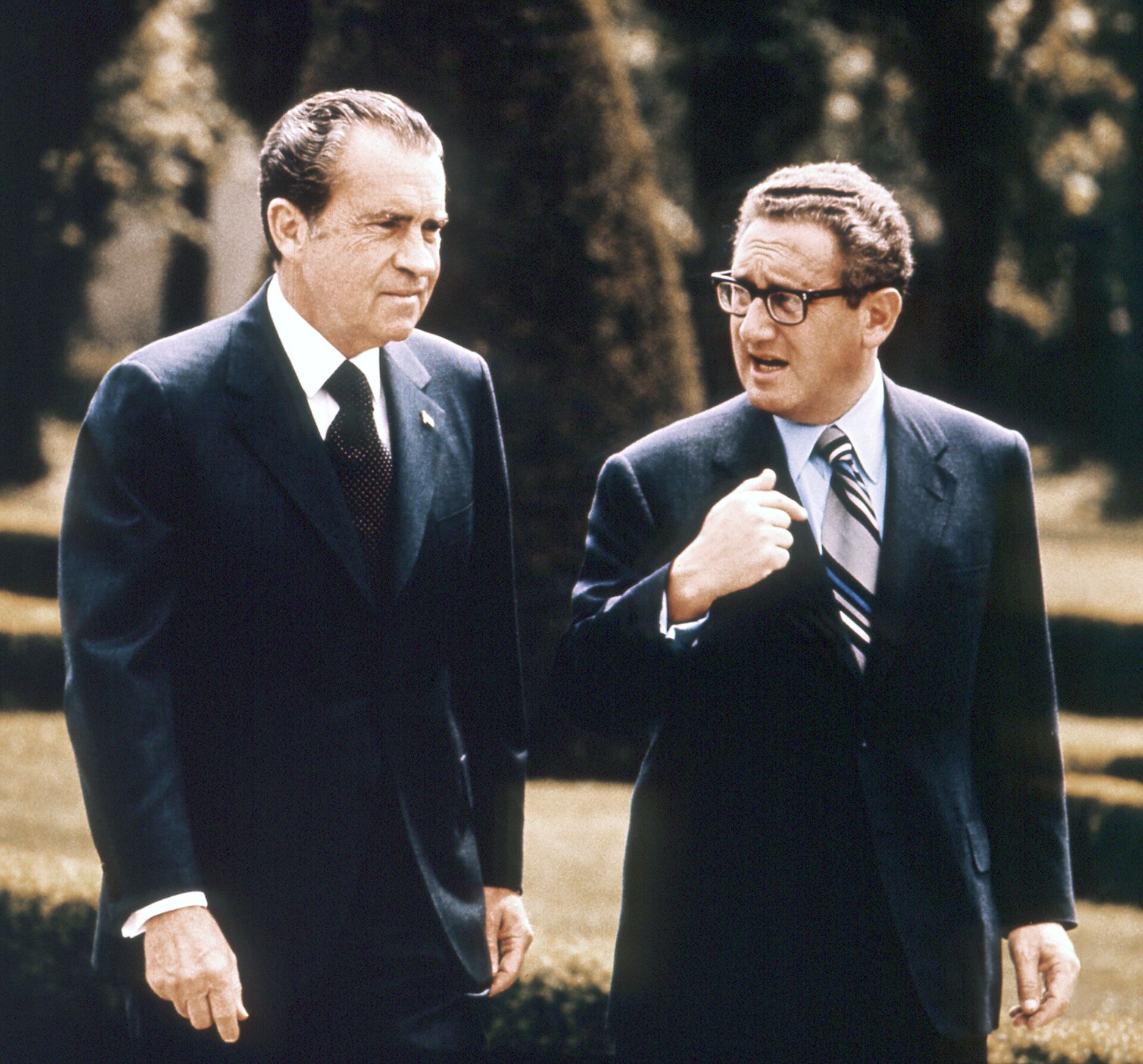https://sputniknews.in/20230527/how-henry-kissinger-failed-to-deter-india-during-1971-pakistan-war-2179823.html
How Henry Kissinger Failed to 'Deter' India During 1971 Pakistan War
How Henry Kissinger Failed to 'Deter' India During 1971 Pakistan War
Sputnik India
Henry Kissinger, who served as America's National Security Advisor (NSA) and Secretary of State under Presidents Richard Nixon and Gerald Ford, turns 100 on Saturday.
2023-05-27T10:28+0530
2023-05-27T10:28+0530
2023-05-27T10:28+0530
india
pakistan
new delhi
pakistan army
indian army
india-pakistan war of 1971
islamabad
us
soviet union (ussr)
https://cdn1.img.sputniknews.in/img/07e7/05/1a/2183242_0:0:2998:1686_1920x0_80_0_0_2a6e301e58b9c280cb722eded8fdc638.jpg
Henry Kissinger, who turns 100 on 27 May, was one of the most important figures in modern US history and played an instrumental role in bringing the Vietnam War to an end. But the enigmatic US diplomat also played a controversial role in the Indo-Pakistani War of 1971, which resulted in the emergence of Bangladesh as a state on the world map.Bangladesh's Road to Independence — and India's Role in It52 years ago, Bangladesh was liberated from Pakistan, albeit not without India's assistance.This came after Islamabad's then-military rulers, under the leadership of former Army chief General Yahya Khan, unleashed a reign of terror on Bangladeshi civilians on 25 March 1971, leading to the brutal killings of thousands, and forcing approximately 10 million of them to flee to India. Bangladesh was then known as East Pakistan. The war officially began after the Pakistan Air Force carried out attacks on 11 Indian airbases on 3 December 1971. India retaliated with counter-strikes on the same night, marking the start of a full-blown war between the two neighbours.Within two weeks, India had accomplished complete dominance over Pakistani forces, with New Delhi emerging victorious on 16 December 1971 after 93,000 Pakistani troops surrendered to the Indian Army. An elated Indira Gandhi, the then-Indian prime minister, announced that "Dhaka is now the free capital of a free country".How US Failed to 'Scare off Indians' in 1971Like India's victory, which was well documented, another episode from the war has continued to generate as much interest even after five decades of the Bangladeshi independence from Pakistan. During the conflict, ex-US President Richard Nixon and his NSA Henry Kissinger at the time were eager to "scare off the Indians" by spurring China to intervene on their behalf.The US was a Pakistani ally, while the Indians were perceived as having close ties with the Soviet Union. Therefore, Washington's meddling in the war would have expectedly drawn Moscow into the conflict.At the same time, the Indo-Pakistan war of 1971 was taking place at a stage when US-China relations were transforming, with the two countries cozying up. Considering Beijing shared close relations with Islamabad, Nixon viewed that a pro-Pakistan approach could help the US in forging a friendship with China.Three days into the military conflict, Nixon wished to persuade Beijing to move soldiers close to its border with India. Kissinger wasn't very convinced by Nixon's proposal, as he told the president that the Chinese view on the issue had witnessed a sea change over the preceding few months. He informed him that then-Chinese President Zhou Enlai had "recalled the Chinese defeat of India in 1962 and hinted rather broadly that the same thing might happen again" when he visited Beijing in July.But that confidence gave way to fear when he visited China for the second time in October, after the signing of the friendship treaty between India and the USSR. Two days after this discussion, Kissinger came up with another plan. He proposed to Nixon that the US send a carrier battle group into the Bay of Bengal to convince the Chinese to move troops to the border with India. Nixon agreed to the proposal.Moving forward with their plan, US nuclear-powered aircraft carrier the USS Enterprise was instructed to begin its journey toward the Indian Ocean. As per documents made public about the developments, Kissinger held a secret meeting with high-ranking Chinese official Huang Hua on the same day, telling him that the US carrier force was on the move. Kissinger also informed Hua that the US would be willing to share satellite intelligence with Beijing if the Soviets moved their troops toward the Chinese border. The Chinese, however, never intervened in the Indo-Pakistan war. On the other hand, Kissinger was apprehensive of the widespread support for India's campaign in Bangladesh, after the US media's extensive coverage of Islamabad's military crackdown on unarmed Bangladeshi civilians.This left Kissinger unsure about sending the Enterprise to the Bangladeshi coastline. Eventually, the US aircraft carrier sailed to Sri Lanka, but never approached Indian waters in the Bay of Bengal.
india
pakistan
new delhi
islamabad
us
Sputnik India
feedback.hindi@sputniknews.com
+74956456601
MIA „Rossiya Segodnya“
2023
Pawan Atri
https://cdn1.img.sputniknews.in/img/07e6/0c/13/139630_147:0:831:684_100x100_80_0_0_8fa2b25903e7787fe6a2698552c167df.png
Pawan Atri
https://cdn1.img.sputniknews.in/img/07e6/0c/13/139630_147:0:831:684_100x100_80_0_0_8fa2b25903e7787fe6a2698552c167df.png
News
en_IN
Sputnik India
feedback.hindi@sputniknews.com
+74956456601
MIA „Rossiya Segodnya“
Sputnik India
feedback.hindi@sputniknews.com
+74956456601
MIA „Rossiya Segodnya“
Pawan Atri
https://cdn1.img.sputniknews.in/img/07e6/0c/13/139630_147:0:831:684_100x100_80_0_0_8fa2b25903e7787fe6a2698552c167df.png
henry kissinger india pakistan war, kissinger india pakistan war, henry kissinger 1971 war, kissinger 1971 war, 1971 war henry kissinger, india pakistan war henry kissinger, 1971 war kissinger, india pakistan war kissinger, henry kissinger turns 100, hbd henry kissinger, happy birthday henry kissinger, henry kissinger celebrates 100th birthday, indo-pakistani war of 1971, liberation of bangladesh, kissinger on independent bangladesh, how bangladesh was founded, how bangladesh was liberated, what is east pakistan,
henry kissinger india pakistan war, kissinger india pakistan war, henry kissinger 1971 war, kissinger 1971 war, 1971 war henry kissinger, india pakistan war henry kissinger, 1971 war kissinger, india pakistan war kissinger, henry kissinger turns 100, hbd henry kissinger, happy birthday henry kissinger, henry kissinger celebrates 100th birthday, indo-pakistani war of 1971, liberation of bangladesh, kissinger on independent bangladesh, how bangladesh was founded, how bangladesh was liberated, what is east pakistan,
How Henry Kissinger Failed to 'Deter' India During 1971 Pakistan War
Henry Kissinger, who served as US national security advisor (NSA) and secretary of state under Presidents Richard Nixon and Gerald Ford, turns 100 on Saturday.
Henry Kissinger, who turns 100 on 27 May, was one of the most important figures in modern US history and played an instrumental role in bringing the Vietnam War to an end.
But the enigmatic US diplomat also played a controversial role in the Indo-Pakistani War of 1971, which resulted in the emergence of Bangladesh as a state on the world map.
Bangladesh's Road to Independence — and India's Role in It
52 years ago, Bangladesh was liberated from Pakistan, albeit not without India's assistance.
This came after Islamabad's then-military rulers, under the leadership of former Army chief General Yahya Khan, unleashed a reign of terror on Bangladeshi civilians on 25 March 1971, leading to the brutal killings of thousands, and forcing approximately 10 million of them to flee to India. Bangladesh was then known as East Pakistan.
The war officially began after the Pakistan Air Force carried out attacks on 11 Indian airbases on 3 December 1971. India retaliated with counter-strikes on the same night, marking the start of a full-blown war between the two neighbours.
Within two weeks, India had accomplished complete dominance over Pakistani forces, with New Delhi emerging victorious on 16 December 1971 after 93,000 Pakistani troops surrendered to the Indian Army.
An elated Indira Gandhi, the then-Indian prime minister, announced that "Dhaka is now the free capital of a free country".
How US Failed to 'Scare off Indians' in 1971
Like India's victory, which was well documented, another episode from the war has continued to generate as much interest even after five decades of the Bangladeshi independence from Pakistan.
During the conflict, ex-US President Richard Nixon and his NSA Henry Kissinger at the time were eager to "scare off the Indians" by spurring China to intervene on their behalf.
The US was a Pakistani ally, while the Indians were perceived as having close ties with the Soviet Union. Therefore, Washington's meddling in the war would have expectedly drawn Moscow into the conflict.
At the same time, the Indo-Pakistan war of 1971 was taking place at a stage when US-China relations were transforming, with the two countries cozying up. Considering Beijing shared close relations with Islamabad, Nixon viewed that a pro-Pakistan approach could help the US in forging a friendship with China.
Three days into the military conflict, Nixon wished to persuade Beijing to move soldiers close to its border with India.
"We have got to tell them that some movement on their part toward the Indian border could be very significant", the US president told Kissinger.
Kissinger wasn't very convinced by Nixon's proposal, as he told the president that the Chinese view on the issue had witnessed a sea change over the preceding few months.
He informed him that then-Chinese President Zhou Enlai had "recalled the Chinese defeat of India in 1962 and hinted rather broadly that the same thing might happen again" when he visited Beijing in July.
But that confidence gave way to fear when he visited China for the second time in October, after the signing of the friendship treaty between India and the USSR.
Kissinger then told Nixon that Beijing looked "afraid of giving Moscow a pretext for attack".
Two days after this discussion, Kissinger came up with another plan. He proposed to Nixon that the US send a carrier battle group into the Bay of Bengal to convince the Chinese to move troops to the border with India. Nixon agreed to the proposal.
Moving forward with their plan, US nuclear-powered aircraft carrier the USS Enterprise was instructed to begin its journey toward the Indian Ocean.
As per documents made public about the developments, Kissinger held a secret meeting with high-ranking Chinese official Huang Hua on the same day, telling him that the US carrier force was on the move.
Kissinger also informed Hua that the US would be willing to share satellite intelligence with Beijing if the Soviets moved their troops toward the Chinese border.
"The President wants you to know that… if the People's Republic were to consider the situation on the Indian subcontinent as a threat to its security, and if it took measures to protect its security, the US would oppose efforts of others to interfere with the People's Republic", Kissinger told Hua at the time.
The Chinese, however, never intervened in the Indo-Pakistan war. On the other hand, Kissinger was apprehensive of the widespread support for India's campaign in Bangladesh, after the US media's extensive coverage of Islamabad's military crackdown on unarmed Bangladeshi civilians.
This left Kissinger unsure about sending the Enterprise to the Bangladeshi coastline.
Eventually, the US aircraft carrier sailed to Sri Lanka, but never approached Indian waters in the Bay of Bengal.



